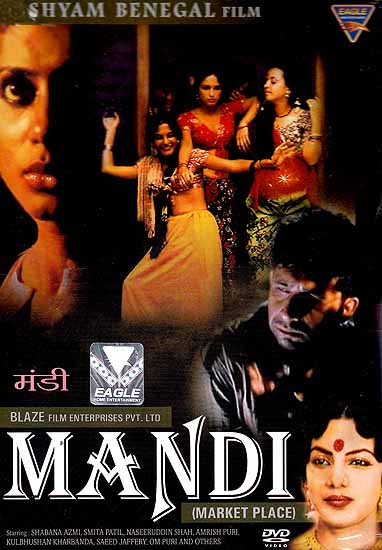When I was asked to pen down a research
paper for my final year project, Shyam Benegal’s much acclaimed movie, Mandi instantly came to my mind sans any clouds of hesitation or doubt.
The movie, somehow, holds a very special place in my heart. The piece that is
going to follow is something that I wrote almost a year back. Republishing it
for the blog has been at the back of my mind ever since. The
article will largely attempt at analysing the characters, dialogues and
narrative of the film.
 |
| A poster of the film. Photo Courtesy: Internet |
With a runtime of 162 minutes, Mandi (Marketplace) covers
the issues of Indian hypocrisy, female oppression, class oppression, political
manipulation, human trafficking, and corruption with rare humour, hard to find
in movies addressing heavy issues. Benegal’s style of
filmmaking is very intelligent and compelling as is evident from his movies
such as Bhumika, Nishant, Ankur, Antardwand, etc. Every character, whether
small or big, is crucially important to the plot of the story. One cannot do
away with any character as each character adds another layer of meaning to the
story, an important feature of parallel cinema. It is very refreshing to view film
where no one particular dialogue, sequence or character is without layers. It’s
a film heavily loaded with multiple layers of indications, both superficial
layer and deeper layer. This makes it very interesting to study a film like Mandi.
The
storyline
Mandi (Market Place) is a1983 Hindi movie boasting of an ensemble
cast of almost 15 actors who later went on to make national and international
mark for themselves. Shabana Azmi(Rukmini Bai), Naseeruddin Shah(Tungroos),
Smita Patil(Zeenat), Ratna Pathak(Baby), Om Puri(Ramgopal), Soni Razdan(Nadra),
Saed Jaffery(Mr. Agarwal), Kulbhushan Kharbanda(Mr. Gupta), Gita
Siddharth(Shanti Devi), Amrish Puri(Baba Khadag Shah), Neena Gupta(Basanti),
and introduced Ila Arun and Harsh Patel(Policeman). Based on the Urdu short story Aanandi by writer Ghulam Abbas, the film
revolves around Rukmini and the brothel she runs in the heart of a city, an
area, Mr. Gupta and Mr. Agarwal wish to convert into a mall. The film is a
satirical comedy on politics and prostitution with the underlying themes of
human trafficking, Indian hypocrisy, manipulation, lobbying, etc.
Following is a short clip from the movie.
Awards
The
film won the 1984 National Film Award for Best Art Direction. It created waves around the world with it being
selected at Indian Panorama at Filmostav, Bombay 1984, and it also got invited
to the Los Angeles Exposition (FILMEX), the Hong Kong International Film
Festival 1984, and London Film Festival 1983.
About Shyam Benegal
| Shyam Benegal. Photo Courtesy: Internet |
Shyam
Benegal is a noted film director whose work is central to and instrumental in
giving shape to alternative cinema/ new cinema/ Indian new wave/ parallel
cinema/ realist cinema. The synonyms are endless as described by endless no. of
film critics. Satyajit Ray is considered to be the father of this school of
filmmaking which dates back to 1950s. Later, film makers like Ritwik Ghatak,
Mrinal Sen, Mani Kaul, Girish Karnad, Adoor Gopalakrishnan, Ketan Mehta, Girish
Kasaravalli and Shyam Benegal carried on the legacy. These filmmakers aimed for
a social change and strong commentary through the use of films. The term
‘parallel’ cinema suggests a genre which runs alongside (not literally) the
mainstream cinema which is your commercial cinema. Benegal has always been
known to make films centred on strong female characters, be it Rukmini and
Zeenat in Mandi or Urvashi in Bhumika or Zubeidaa from Zubeidaa. He was awarded the Padma Shri in 1976 and the Padma Bhushan in 1991.



